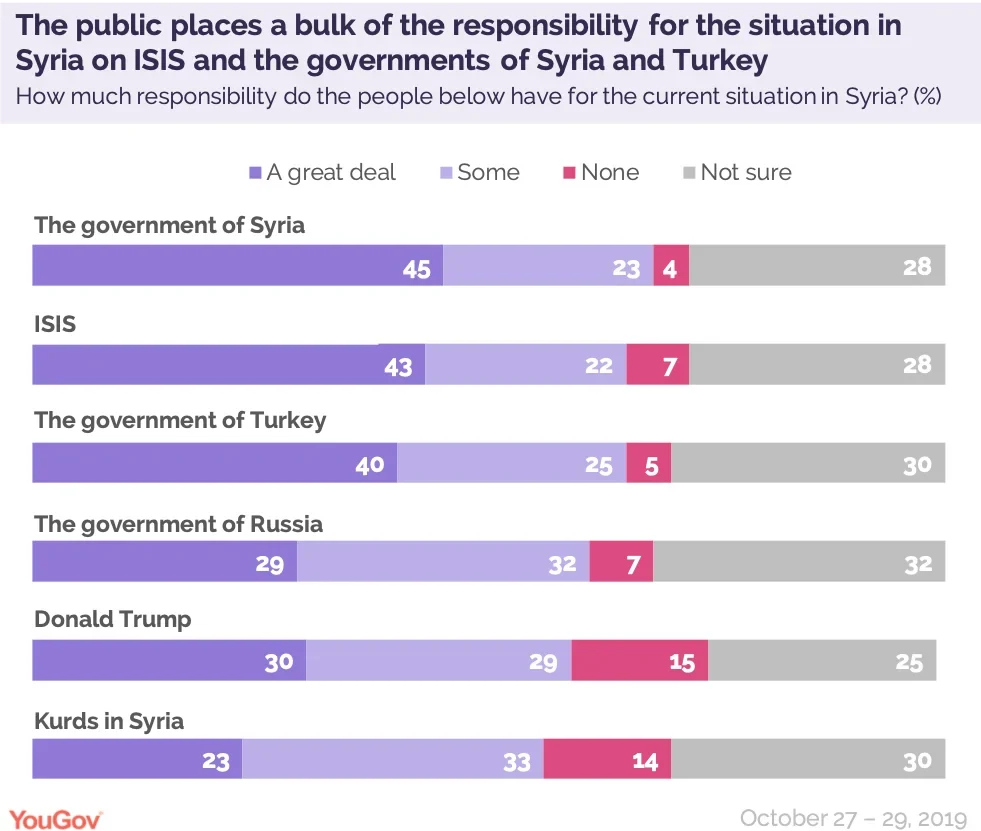Who is responsible for the situation in Syria?
American troops were recently replaced by Russian troops in Syria, and Kurdish fighters there were simply displaced. The movement has the public in the latest Economist/YouGov Poll thinking about Russia’s and America’s involvement in the Middle East.
The largest share of the US public gives Syria itself, ISIS, and Turkey the bulk of responsibility for the war-torn country. President Donald Trump and Russia next rank after those three. Fewer than one in four (23%) say the Kurds in Syria have “a great deal” of responsibility for the current situation in Syria.

President Trump’s withdrawal of US troops from Syria changed the military situation for the Kurds, as Turkey and Russia sent in troops. What had been a five-day ceasefire agreement is now permanent, though hardly any Americans believe that. The president gets credit from the public for that cease-fire, with more than half of the public (55%) agreeing that Trump deserves at least some of the responsibility for achieving that cease-fire. More, however, say Turkey (63%) is responsible and as many credit Syria (56%) as credit the president.
More important, perhaps, is that Americans don’t believe the ceasefire will last. Only 6 percent think it will be. Nearly ten times that percentage (58%) disagree. Republicans, most of whom credit the President for the achievement of a ceasefire, are still dubious about the ceasefire lasting. Just 12 percent of Republicans agree it will be permanent.
Americans continue to disapprove of that withdrawal – this week by 47 percent to 33 percent.
There is a great deal of pessimism about the situation in the Middle East, as few Americans think ISIS is completely defeated (a claim the President made after the physical “Caliphate” was in fact eliminated). Two-thirds of the public (69%) describes ISIS as an immediate and serious threat to the United States or a somewhat serious threat.
While most Americans (64%) admit that it’s “too soon to tell” what will happen in Syria in the long-term, among those with an opinion more than twice as many think what will happen will be bad for the US (26%) as believe the outcome will be positive (11%).
Even after the death of ISIS leader Abu Bakr al-Baghdadi, the President’s approval rating on handling terrorism has changed little. Opinion is divided on that: 44 percent overall approve of his handling of terrorism, 43 percent disapprove. When it comes to Trump’s handling of foreign policy in general, more Americans disapprove (49%) than approve (40%). The responses to both questions this week are about the same as they were last week.
Americans continue to worry about the President’s handling of Russia: in this poll, 45 percent disapprove and 36 percent approve. There is a perception that Russia hasn’t changed since the Cold War. While fewer than one in four believe that the US and Russia are entering another Cold War (22%), nearly two in three (62%) believe that Russia would like to return to the Cold War borders of the Soviet Union. hat would affect countries like Ukraine, the Baltics, Georgia, Azerbaijan, among others, which achieved independence after the fall of the USSR). Six in 10 (62) believe Russia wants its old borders again, with only 8 percent thinking Russia does not want a return to Soviet-era boundaries.
For many Americans, nothing has changed, despite the dismantling of the Soviet Union, which began 30 years ago. Only one in four believes the U.S. (and the world) are safer today than they were during the Cold War. One in four (26%) believe that Russia is friendlier to America than it was back then.
Republicans are more positive about Russia, though they remain suspicious: Six in 10 (63%) of Republicans regard Russia as an unfriendly country or an enemy. But while Democrats say Russia is the greatest foe of the United States (with nearly twice as many choosing Russia over North Korea, China, and Iran), more Republicans cite those three other countries than name Russia, with China first.
Independents are as likely to name China as to name Russia as the United States’ greatest foe.
Related: On impeachment, the President’s party remains intensely loyal
Read the full results from toplines and tables results from this week’s poll
Image: Getty








